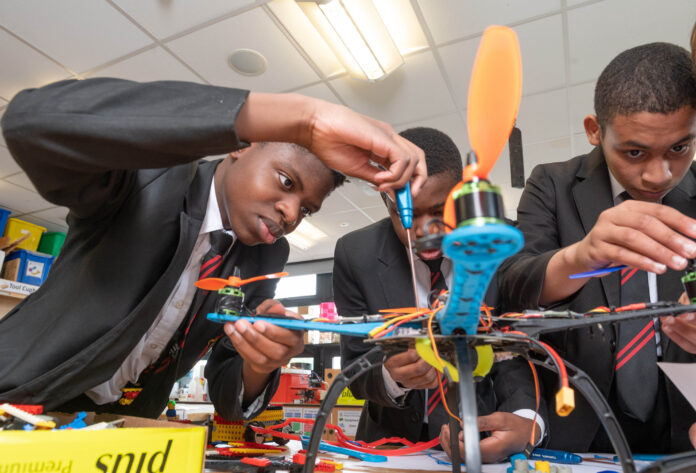Students from Cardinal Langley RC High School have triumphed in Raytheon Technologies nationwide Quadcopter Challenge, which offers hundreds of pupils from around the country the chance to show off their engineering skills.
In the national final, the team named ‘Stop Droning On’ beat five rival teams from across England, Scotland, and Wales after completing a series of challenging tasks and impressing expert judges on their engineering feats and innovative ideas for Space exploration.
During the challenge, pupils were asked to use their science and maths skills to design a four-bladed, remotely piloted air system – commonly known as a quadcopter.
This year’s theme, “Mission to Mars,” asked students to push the limits on current quadcopter designs, tasked with thinking of creative ideas to overcome the challenging Martian conditions, with adaptations made to the design to undertake key missions on the Red Planet.
Along with 20 other schools and air cadet teams, the team at Cardinal Langley RC High School has spent months designing and building their quadcopters. The challenge culminated in an exciting day of competition where young people from all over the country presented their quadcopters and responses to tasks set to them by some of the UK’s leading STEM experts.
The winning team comprised of Jadon Dooley, John Kennedy, Nogosa Obayuwana, Ruben Almeida and Victor Bobad, with the help of teachers and the mentorship from their Raytheon Technologies STEM Ambassador.
The judges, who have a wide range of backgrounds including engineering, coding and space exploration, assessed students on how well suited they are to navigating conditions on Mars.
This year’s judges included Charlene Hunter, Founder of Coding Black Females, who said: “Giving children opportunities to engage with science, maths and engineering outside of traditional classroom assignments opens their eyes to the possibilities of a career in STEM.
“When I was 10, I wrote my first line of code, I was lucky enough to be exposed to technology from a young age. However, for many young people, a career in STEM isn’t something they consider as an option for themselves. It has been so exciting to watch the energy of young people learning and getting into STEM subjects. Inspiring the next generation scientists, mathematician, and engineers from all backgrounds and walks of life is so important in our journey to creating a more inclusive sector.”
Alex Rose-Parfitt, Engineering director at Raytheon UK, said: “After a challenging period for many students, we wanted to excite and re-engage young people in learning by giving them the opportunity to test and apply their skills to activities outside of their usual curriculum. As we enter a new era of space exploration, we hope this year’s theme of Mission to Mars will encourage the next generation of leaders and innovators to pursue a career in STEM.”
James Hogg, teacher at the school, said: “The students have shown exceptional effort, resilience, and dedication to work together to achieve so much in a short space of time. Their commitment to lunch times, after school and online meetings has led to teamwork, discussion, and solutions to problems. I’m so proud of them, and hope that they continue to show this dedication to their studies in the future.







